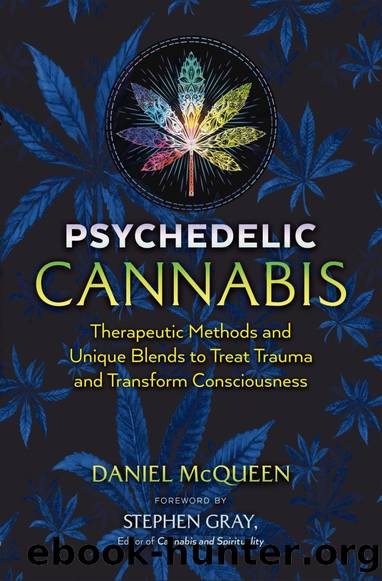Psychedelic Cannabis: Therapeutic Methods and Unique Blends to Treat Trauma and Transform Consciousness by Daniel McQueen

Author:Daniel McQueen [McQueen, Daniel]
Language: eng
Format: epub
ISBN: 9781644113387
Barnesnoble:
Publisher: Inner Traditions/Bear & Company
Published: 2021-08-28T00:00:00+00:00
SETTING SACRED SPACE
Setting sacred space combines the aspects of set, setting, and skill into one practice. Itâs a way to create safety, cultivate awareness, and bring skill and intention to any medicine experience.
The ceremony itself is very archetypal, and some form of this practice exists in most religious and mystical traditions. While itâs possible to speak in spiritual and energetic terms, itâs also relevant to speak to the power of the imagination to induce different states of mind. In a sense, using the imagination, imagery, symbolism, and words helps program an inner mind state well-resourced for the experience at hand. Setting sacred space is a skill set that can be developed over time to increase personal resilience.
Generally, a circle around the meditation space is drawn with our mindâs eye, our imagination, and energetic proprioceptive awareness. Usually, this is done in a clockwise motion starting in the east and proceeding to the south, west, and north and ending back in the east. I call this last section âclosing the hatch.â Our awareness is then brought to the center, the vertical axis found in the middle of the circle and in the center of our embodied sense of self. Awareness is then turned to either the above, below, and within, or the below, above, and within. The four primary directions represent aspects of self, whereas the vertical axis represents systems larger than the self.
From an energetic paradigm, orienting to the four directions allows us to orient along natural electromagnetic fields, which can create a strong grounding experience. The number 4 is very stable. In a sense, setting sacred space is aligning our own energetic field with the larger collective energetic field of the space, the group (if youâre working with one), and the vastly larger field of the Earth, creating a subtle group cohesion that supports intentional experiences.
The number 7 is relevant in many traditions, too, including the seven stages of alchemy, and working with the seven directions also makes sense from a somatic resourcing perspective, regardless of any sort of spiritual significance. Registering safety in all directions, making an intentional observation that your space is safe, helps bring a deeper sense of safety and relaxation to your psychedelic experience.
It is controversial to acknowledge the use of a prayer within a community that has experienced so much trauma in religious contexts. However, prayer combined with the religious or spiritual use of psychedelics is an ancient practice. According to Terence McKenna, the use of psychedelics is possibly older than humanity itself. In a sense, prayer is a reclaiming of an ancient part of ourselves and is sometimes an important part of our healing process.
While this practice comes from religious and mystical traditions, it can also be thought of in terms of developing psychological resiliencies. The directions can be known as the winds, the guardians, the spirits, the energies, the symbols, and so on. It is okay to make this practice your own and work with a cultural orientation congruent with your identity, staying mindful of issues related to cultural appropriation.
Download
This site does not store any files on its server. We only index and link to content provided by other sites. Please contact the content providers to delete copyright contents if any and email us, we'll remove relevant links or contents immediately.
Should I Stay or Should I Go? by Ramani Durvasula(7642)
Why We Sleep: Unlocking the Power of Sleep and Dreams by Matthew Walker(6688)
Fear by Osho(4724)
Flow by Mihaly Csikszentmihalyi(4675)
Rising Strong by Brene Brown(4440)
Why We Sleep by Matthew Walker(4424)
The Hacking of the American Mind by Robert H. Lustig(4361)
How to Change Your Mind by Michael Pollan(4343)
Too Much and Not the Mood by Durga Chew-Bose(4324)
Lost Connections by Johann Hari(4166)
He's Just Not That Into You by Greg Behrendt & Liz Tuccillo(3874)
Evolve Your Brain by Joe Dispenza(3657)
The Courage to Be Disliked by Ichiro Kishimi & Fumitake Koga(3475)
Crazy Is My Superpower by A.J. Mendez Brooks(3384)
In Cold Blood by Truman Capote(3368)
Resisting Happiness by Matthew Kelly(3332)
What If This Were Enough? by Heather Havrilesky(3300)
The Book of Human Emotions by Tiffany Watt Smith(3287)
Descartes' Error by Antonio Damasio(3264)
